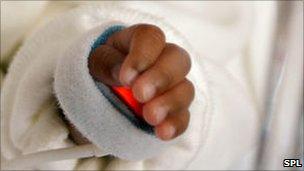Early birth stress disorder link
- Published

Preterm birth can cause health problems for babies
Post traumatic stress disorder (PTSD) is a risk factor for premature birth, research suggests.
A study of more than 800 women in the US also found a link with having a smaller baby.
Babies of women with the anxiety disorder, triggered by a harrowing event, weighed about half a pound less than usual.
Researchers at the University of Michigan, US, say PTSD needs to be taken into account in maternity care.
Nearly half of the women in the study were African American.
Lead researcher Julia Seng, Professor of Nursing at the University of Michigan, said: "An African American infant in Michigan is 70% more likely to be born prematurely than an infant of any other race.
"Therefore PTSD, which is treatable and affects African Americans more widely, may be an additional explanation for adverse perinatal outcomes.
"It is essential that outcomes are improved in this high-risk group of women. Maternity care needs to take traumatic stress into account with awareness being raised amongst health workers."
John Thorp, BJOG deputy-editor-in-chief. said women with PTSD need specialised care, and screening is essential to ensure the best outcome for mother and baby.
He added: "Raising awareness will help health workers identify those women at risk and provide the relevant support during the antenatal period."
The research, published in the journal,, followed 839 women.
They included women who had PTSD, women who had suffered a traumatic event but had not developed psychological symptoms, and women with no major life stressors.
Babies born to women with PTSD weighed half a pound less than traumatised women who did not develop PTSD, and nearly half a pound less than women who did not suffer a trauma.
The link with lower birthweight was most marked in women with PTSD who had also been abused in childhood.
- Published13 July 2011